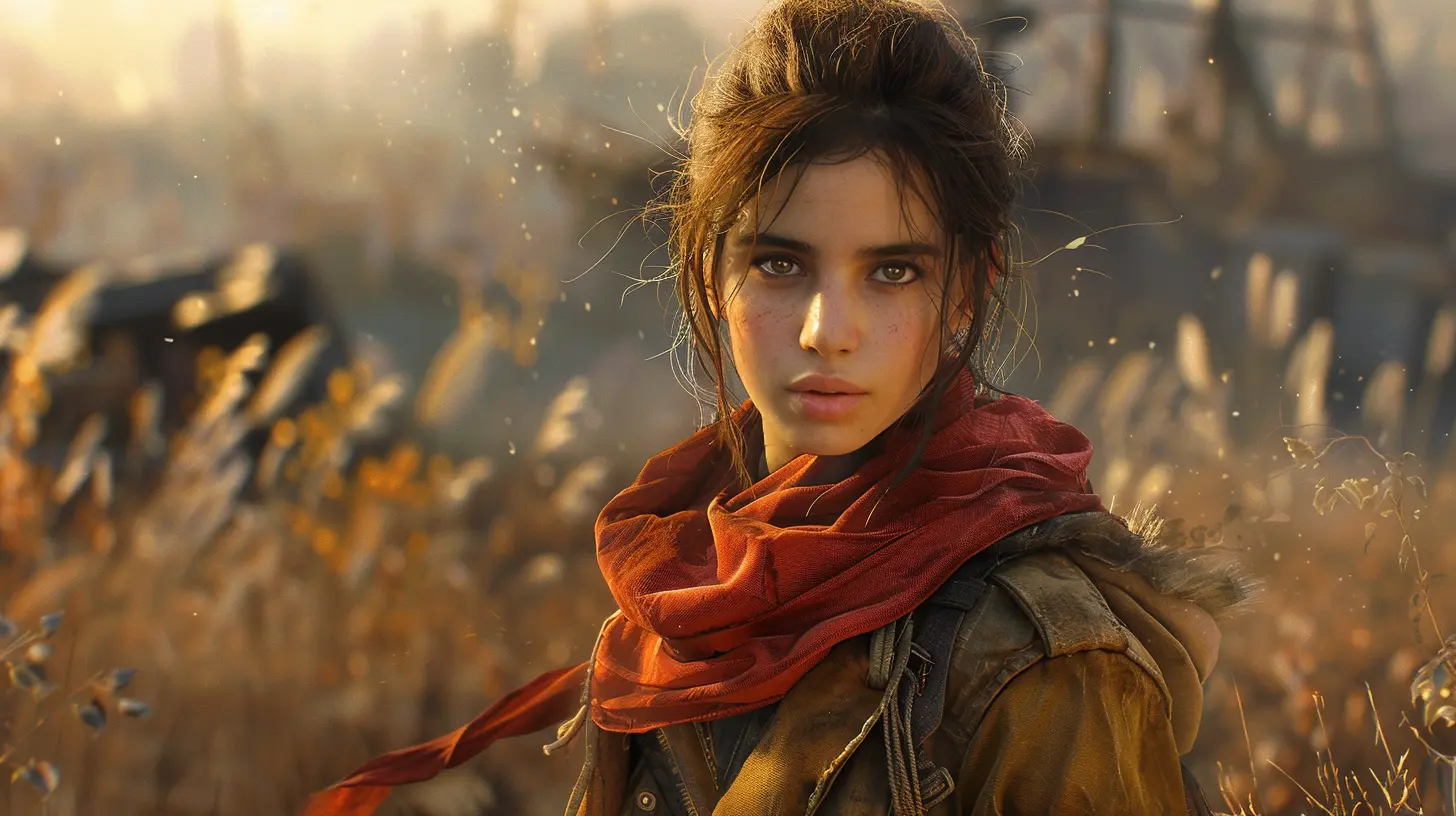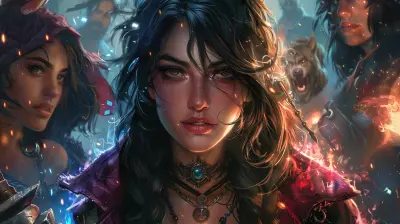16 December 2024
When it comes to storytelling in video games, you might think that a chatty, charismatic protagonist is the key to keeping players hooked, right? But what if I told you that some of the most emotionally impactful gaming experiences come from characters who never utter a single word? Silent protagonists—those stoic, wordless heroes—have this unique way of pulling players into the game’s world and hitting them right in the feels.
You know what I’m talking about. There's something oddly powerful about these characters. They don’t speak, yet they leave lasting impressions. How is that even possible? Why do we, as players, feel such a deep emotional connection with silent protagonists? Let’s dive into it.
What Is a Silent Protagonist?
Let’s start with the basics here. A silent protagonist is exactly what it sounds like—a main character who doesn’t talk. Well, at least not out loud. They might have the occasional grunt, scream, or sigh, but dialogue? Nope. Nada. You won’t hear them cracking jokes or delivering epic speeches.Think Link from The Legend of Zelda series. Or the ever-mute Gordon Freeman from Half-Life. These are characters who don’t need words to make an impact. Instead, they rely on actions, the player’s imagination, and the game’s world-building to tell their story.
Why Do Developers Use Silent Protagonists?
Okay, so why would a game developer intentionally choose to make their main character silent? Isn’t that kind of…risky? Well, not really. Silent protagonists are actually a genius move, and here’s why:1. Immersion and Player Projection
Developers often use silent protagonists to help you, the player, feel like you are the character. Without a set personality or voice, you can project your own thoughts, emotions, and decisions onto them. It’s like wearing a custom-made pair of shoes—they fit you perfectly because they’re you.Ever felt like you are the Hero of Time while playing The Legend of Zelda? That’s no accident. Link doesn’t talk because he’s meant to be a blank slate for your own feelings. When Zelda begs him to save Hyrule, you’re not watching some character make a promise—you’re the one making that promise.
2. Universal Appeal
Let’s face it: not everyone is going to love a protagonist with a super-strong personality. What’s hilarious or relatable to one player might be annoying or cringey to another. Silent protagonists sidestep this issue entirely. They’re neutral, universal, and adaptable.Think about Minecraft’s Steve. He doesn’t talk, he doesn’t emote much, but he’s beloved worldwide. Why? Because his silence allows players from all cultures and backgrounds to see themselves in him.
The Emotional Impact of Silence
Now here’s where things really get interesting. You’d think silence might make a protagonist feel…well, flat. But it’s actually the opposite. Silent protagonists can tug at your heartstrings in ways that talking characters sometimes can’t. Here’s how:1. Actions Speak Louder Than Words
Without dialogue to fall back on, silent protagonists rely on actions to convey their personality. And let’s be real—actions can be way more powerful than words. When a silent character risks their life to save someone, you feel it. They don’t need to say, “I’ll protect you!” because their actions already scream it.Take Chell from Portal. She doesn’t talk, but you still root for her as she navigates deadly puzzles and outsmarts GLaDOS. Her silence doesn’t make her less relatable—it makes her resilience shine brighter.
2. Player-Driven Emotional Depth
Here’s the thing: silent protagonists leave a lot of blanks for you to fill in. What do they think? How do they feel? You get to decide. And because you’re actively imagining their emotions, you form a deeper connection with them.Think of Undertale. Sure, the player character, Frisk, doesn’t talk, but that just means you get to mold their personality. Are they a compassionate pacifist? A ruthless warrior? It’s all up to you, and that sense of control strengthens your bond with them.
3. Ambiguity Creates Mystery
Sometimes, it’s what a character doesn’t say that keeps us intrigued. Silent protagonists often have this air of mystery about them. You want to know what they’re thinking, and that curiosity keeps you invested.Remember Gordon Freeman from Half-Life? His silence feels intentional. It makes him seem cool, composed, and enigmatic—even though you’re the one deciding his every move. You don’t need him to monologue about the alien invasion; you’re too busy living it through him.
Games That Nailed the Silent Protagonist Formula
Let’s take a moment to appreciate some of the games that absolutely crushed it when it comes to silent protagonists. These are the titles where the lack of dialogue somehow deepened the emotional impact.1. The Legend of Zelda Series (Link)
We’ve already mentioned Link, but seriously, he’s the gold standard of silent protagonists. His lack of words makes his journey across Hyrule feel personal. When you’re battling Ganon or solving puzzles, it’s not just Link—it’s you. And how about those moments when Zelda looks at him with hope in her eyes? Yeah, silent but deadly—emotionally, that is.2. Half-Life Series (Gordon Freeman)
Gordon Freeman is the epitome of “actions speak louder than words.” As a mute scientist-turned-survivor, his silence reinforces the grim, immersive atmosphere of the game. Players don’t need Gordon to talk because they’re Gordon.3. Journey
Okay, this one’s a bit different—it doesn’t even have dialogue! The player-controlled character in Journey doesn’t speak, yet the emotional connection is undeniable. The game uses visuals, music, and simple gestures to create a profound sense of companionship, especially if you play alongside another silent player.4. Undertale (Frisk)
Frisk’s silence in Undertale puts the moral weight of every decision squarely on your shoulders. Do you spare the monsters or fight them? Frisk doesn’t tell you what to do—you decide. And that freedom? It’s what makes the emotional highs and lows hit so hard.The Risks of Silence
Alright, I’d be lying if I said silent protagonists are always a hit. They’re not without their challenges. If the narrative or world-building isn’t strong enough, silence can come off as boring or lazy. A silent protagonist in a bland, uninspired game? Yeah, no thanks.Players also sometimes want clarity. Sometimes, you just want to hear the character’s thoughts instead of guessing. I mean, imagine if Nathan Drake from Uncharted didn’t talk—would the series still be as fun? Probably not.
Silent protagonists work best when the game is designed to complement their silence. It’s a balancing act, and when developers get it wrong, the emotional connection can fall flat.
So, Why Do We Love Them?
At the end of the day, the emotional connection with silent protagonists comes down to one thing: we see ourselves in them. Their silence isn’t a void—it’s a mirror, reflecting our own thoughts, feelings, and choices.Games with silent protagonists invite us to take a more active role in the story. They blur the line between character and player, making every victory, every loss, and every emotional moment feel personal. And honestly? That’s what makes those games unforgettable.
So, the next time you’re playing as a silent protagonist, take a moment to appreciate the genius behind that choice. They might not talk, but their silence? It’s louder than words.









Raina Jones
Silent protagonists: the ultimate introverts! They might not talk much, but their emotional range rivals a soap opera star!
February 2, 2025 at 3:46 PM